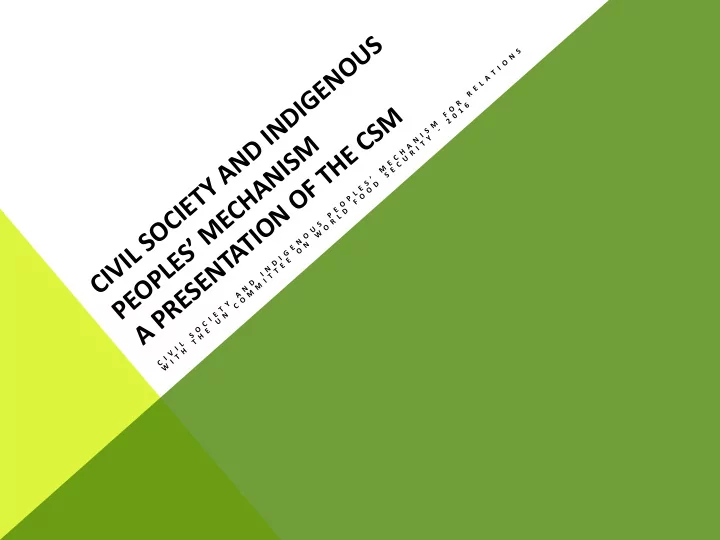

CIVIL SOCIETY AND INDIGENOUS S N O I T A L E R R A PRESENTATION OF THE CSM 6 O 1 F 0 2 M - S PEOPLES’ MECHANISM I Y N T A I H R C U E C M E S ’ S D E O L O P F O E D P L R S O U W O N N E O G I E D E N T I T I D M N M A O Y C T E N I U C O E S H T L I H V T I I C W
WHAT IS IS T THE C CSM? Nature and Mandate
The Civil Society Mechanism for relations with the CFS: Was established in 2010, as an essential and autonomous part of the • reformed CFS; Gives a particular voice and space to the participation of those affected • by food insecurity and malnutrition; The CSM purpose is to facilitate civil society participation into the policy • process of the CFS; Is an open and inclusive space and hence does not have formal • members, but participating organisations.
ORGANISING PRINCIPLES
The CSM is based on 11 constituencies Smallholders Agricultural Indigenous and Family and Food Fisherfolks Pastoralists Peoples farmers Workers Urban Food Women Consumers Landless Youth NGOs Insecure And 17 sub-regional units for organisations from all sub-regions
THE CSM: Gives priority to the organisation and movements of the people , recognising that: They are the organisations of the rights-holders; • They are subject of their own development; • They are the most affected by food insecurity and • malnutrition; And the most important contributors for food • security and nutrition worldwide;
THE CSM: • Respects pluralism , autonomy , diversity and self-organisation and tries to ensure a balance of constituencies, gender, and regions; • As a space does not represent organisations that participate in it. They represent themselves and articulate positions together with others through the CSM to the CFS.
Who i is p part o of t f the C CSM?
The participating organisations, particularly those • who organise small-scale food producers and consumers, represent several hundred million individuals from all continents . In this sense the CSM is the largest global space of civil society organisations working on food security and nutrition. Far more than 380 million smallholders and • family farmers, agricultural workers, fisher people, pastoralists, indigenous peoples, consumers and urban food insecure around the world are affiliated to organisations that participate in the CSM.
Structure a and de delib iberatio ion n pr proce ocess
• CSM positions brought to the CFS are products of collective, participative and inclusive deliberation processes among many actors from different perspectives . • All CFS workstreams are followed by a CSM Policy Working Group which is open to all civil society organizations that want to engage with this process.
Constituencies Process CSM Smallholders and Family 11 Global and Continental Farmers Coordination Units Committee Fisherfolks Pastoralists/Herders 17 Sub-regional Units Indigenous Peoples Consumers CSM Advisory Group Agricultural and Food CSM Policy Working Groups Workers CFS Urban Food Insecure CSM Advisory Annual Landless Group CFS Policy Working Forum Groups Women Youth CFS Plenary Session NGOs
Why i is t the C CSM s so c committed t to t the CF CFS?
• The CSM has formulated positions and contributed proposals to all CFS processes since the reform, with an enormous commitment of its participating organizations to the different workstreams. • Through this engagement, we have given a lot of substance and legitimacy to the CFS and its negotiations and decisions.
Why are the participating organizations in the CSM so committed to the CFS?
A n new v vision f for g global g governance o on f food s security a and nutrition, f , focusing o on t the p progressive r realization o of t the right t to f food
Participation and inclusiveness have made the CFS a unique experience in the UN, particularly for organizations of small- scale producers.
Most topics dealt with by the CFS so far have been • extremely relevant to urgent demands of our constituencies • Most processes and results of the CFS have shown that many of civil society’s concerns and proposals have been heard by the Member States and included into their decisions.
We have high expectations on the CFS, the quality of its processes and results, the implementation and monitoring of its decisions, its agenda ahead and its future as a truly inclusive governance space for food security and nutrition.
Gracia ias! Merci! i! Thank y you! u!
Recommend
More recommend